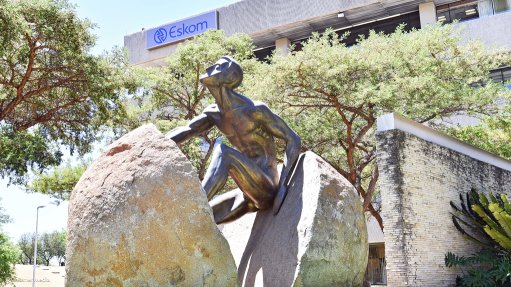Firm lauds government’s reducing hurdles for less sensitive projects



SAM LEYDE The new norms present renewable-energy developers and environmental assessment practitioners with an alternative legislative process to consider during the planning and authorisation phase of a project
KELLY ARMSTRONG SRK’s experience is that projects may struggle to meet these criteria to trigger exemption, since all renewable projects have large footprints, and many cannot always be located in less sensitive areas
Global consultancy SRK Consulting lauds the significant efforts aimed at reducing the environmental hurdles for lower sensitivity renewable-energy projects.
In a move to support the development of renewable energy, South Africa adopted new norms to simplify and speed up the authorisation process for solar PV facilities and battery energy storage systems (BESS).
According to SRK Consulting senior environmental consultant Sam Leyde, former Forestry, Fisheries and Environment Minister Barbara Creecy exempted solar PV and BESS facilities which are developed or expanded in areas of low or medium environmental sensitivity from having to obtain environmental authorisation (EA) under the National Environmental Management Act (Nema).
Leyde notes that, while the draft Integrated Resource Plan of 2023 promotes the development of renewables in South Africa subject to the requisite environmental approvals, the obtaining of such approvals has typically involved lengthy environmental impact assessment (EIA) processes of up to 18 months – making the rapid delivery of renewables difficult. He points out that the new norms do not apply to wind farms, which often have more significant impacts – notably to avifauna.
“These newly announced norms aim to facilitate the deployment of solar PV and BESS facilities while still upholding the objectives of Nema,” he says.
“This presents renewable-energy developers and environmental assessment practitioners (EAPs) with an alternative legislative process to consider during the planning and authorisation phase of a project.”
Applying the Norms and Registration
The new norms apply to proposed solar PV or BESS facilities in areas where the effects on at least four biodiversity themes, or categories, and agriculture are of low or medium environmental sensitivity.
SRK Consulting environmental consultant Kelly Armstrong points out that the sensitivity of a proposed site is assessed by using the Department of Forestry, Fisheries and the Environment (DFFE) screening tool to generate a coarse sensitivity rating and by appointing independent and suitably qualified specialists to verify site sensitivity in accordance with the norms.
“If both steps confirm low or medium sensitivity for all five themes, then the exclusion applies and a registration process can be initiated,” Armstrong explains. “SRK’s experience is that projects may struggle to meet these criteria to trigger exemption, since all renewable projects have large footprints, and many cannot always be located in less sensitive areas.”
Armstrong argues that while the introduction of the norm may fast-track some permitting processes, it is likely to introduce some uncertainty for developers, until such time that the environmental sensitivities of a project site are verified.
“If a project does not need EA, it stills need to be registered through a shorter, formal process,” she explains. “The norm requires that a registered EAP must compile a Site Sensitivity Verification Report and an Environmental Management Programme to manage the impacts associated with the proposed facility. Stakeholders must also be consulted and given the opportunity to review and comment on these reports.”
A registration application, including evidence of the consultation process, is then submitted to the DFFE, which has ten days to register the facility or inform the applicant of any deficiencies. As with an EIA process, stakeholders must be notified of the decision and are entitled to appeal.
Leyde says that the adoption of these norms has the potential to accelerate the transition to renewable energy in South Africa, improving energy security and diversity while reducing greenhouse-gas emissions.
“To ensure this is done without compromising our environment, it is crucial that the norms are implemented and monitored in a transparent and accountable manner,” he says. “It is possible that they could be reviewed and revised periodically, based on lessons learnt to ensure alignment with the best practice, as well as to balance the interests and needs of stakeholders.”
Article Enquiry
Email Article
Save Article
Feedback
To advertise email advertising@creamermedia.co.za or click here
Press Office
Announcements
What's On
Subscribe to improve your user experience...
Option 1 (equivalent of R125 a month):
Receive a weekly copy of Creamer Media's Engineering News & Mining Weekly magazine
(print copy for those in South Africa and e-magazine for those outside of South Africa)
Receive daily email newsletters
Access to full search results
Access archive of magazine back copies
Access to Projects in Progress
Access to ONE Research Report of your choice in PDF format
Option 2 (equivalent of R375 a month):
All benefits from Option 1
PLUS
Access to Creamer Media's Research Channel Africa for ALL Research Reports, in PDF format, on various industrial and mining sectors
including Electricity; Water; Energy Transition; Hydrogen; Roads, Rail and Ports; Coal; Gold; Platinum; Battery Metals; etc.
Already a subscriber?
Forgotten your password?
Receive weekly copy of Creamer Media's Engineering News & Mining Weekly magazine (print copy for those in South Africa and e-magazine for those outside of South Africa)
➕
Recieve daily email newsletters
➕
Access to full search results
➕
Access archive of magazine back copies
➕
Access to Projects in Progress
➕
Access to ONE Research Report of your choice in PDF format
RESEARCH CHANNEL AFRICA
R4500 (equivalent of R375 a month)
SUBSCRIBEAll benefits from Option 1
➕
Access to Creamer Media's Research Channel Africa for ALL Research Reports on various industrial and mining sectors, in PDF format, including on:
Electricity
➕
Water
➕
Energy Transition
➕
Hydrogen
➕
Roads, Rail and Ports
➕
Coal
➕
Gold
➕
Platinum
➕
Battery Metals
➕
etc.
Receive all benefits from Option 1 or Option 2 delivered to numerous people at your company
➕
Multiple User names and Passwords for simultaneous log-ins
➕
Intranet integration access to all in your organisation




















